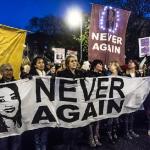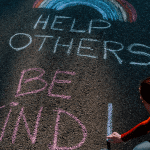With cases of the coronavirus increasing daily in the U.S., wearing a mask has become commonplace for many of us. I’m so glad today’s writer, Amanda Udis-Kessler, decided to follow a rumination in her heart about the spiritual nature of wearing a mask as well. What a gift to the rest of us, so listen and learn to what she has for the rest of us. Proceeds from today’s post go toward RAICES.
—

I pull up to the drug store or the post office or the supermarket, and time stops. Maybe I’ve been singing in the car; now I fall silent. Maybe I’ve been distracted; now I focus. Maybe I’ve been overwhelmed; now I leap into action. Ritually, even prayerfully, I put on my mask.
Once the straps are safely tucked behind my ears, I pull out the strip of nylon that was once part of a stocking, smooth it out, and put it over the mask, double-tying it behind my head. I adjust the strip to make sure it’s holding the mask tightly. I take a deep breath, squirt on some hand sanitizer, and restart my life.
If my Facebook feed these days is any indication, mask-wearing is at the heart of a struggle over meaning, values, and politics. Civic-minded people wear masks. Intelligent people wear masks. Jesus would wear a mask. Mask-wearing is ethical. Refusing to mask is racist. Alternately, mask-wearing is un-masculine and refusing to mask is a strike for freedom. There is a Facebook group called Mask Wearers Unite!! and one called the Anti-Mask Wearing Society of 2020.
Wearing a mask during the COVID-19 pandemic may be many things indeed. But for me, it’s also a spiritual practice.
The kind of masks most of us wear won’t protect us from others as much as they will protect others from us. Reflecting on this point, I’ve come to see mask-wearing as an act of generosity, a gift I can give other people, a way I can show my care for them even if I don’t know them and never will.
Masking is a practice of compassion, the literal embodiment of my desire that I not be the cause of someone else becoming sick. Wearing a mask is even a small gesture of hospitality, letting others know that I welcome their presence and wish to offer them a safe space.
The mild discomfort of being masked deepens my sense that I’m offering a kind of gift. I don’t believe that spirituality is about how much we can suffer, and most of my spiritual life is bound up with joy. That said, there’s something open-hearted about being willing to be a bit uncomfortable to support others’ well-being.
Maybe there’s a component of humility as well: someone else’s life is, in fact, more important than my total comfort. The great interdependent web of all existence is suffering right now, in more ways than I can count and at more levels than I can be aware of. If I can avoid causing more harm, it’s worth the effort.
There’s also the effect that mask-wearing has on my mind and energy. Putting on my mask feels like an intentional practice of slowing down and being present in the moment. While masked, I’m much more likely to maintain a reflective silence, to speak less overall, and to practice a kind of simplicity when I must speak. I conserve words, use shorter sentences, listen more.
Having spent half a century talking often (and often too much), I find the silence to be surprisingly tender. It evokes a sense of gratitude in me: for the freedom, health and a car that allow me to run errands in the first place, for the friends that sewed masks and gave them to me, for the truth that any of us can choose kindness instead of cruelty when humanity is so clearly always capable of both options.
Ultimately, seeing mask-wearing as spiritual means it is political as well – in the best possible sense of the word. It is a way of loving one’s neighbor as oneself. Given the racism and class inequality in the US and given who is most at risk for COVID-19, loving one’s essential worker neighbor as oneself is inevitably political because it is about the well-being of the polis, the whole community, especially the least of these.
Errands done, I’m back in the car. I untie the nylon strip and remove the mask, careful to touch only the ends of both. I take another deep breath, give thanks for the day, and drive home, the silence settling gently in my heart.
—
 Amanda Udis-Kessler is a writer, songwriter, hymn-writer, sociologist, and social justice educator. She is a member of Vista Grande UCC in Colorado Springs, where she currently serves informally as composer-in-residence. Find her latest album of original songs and hymns at everysoulmusic.com and her free-use hymns and worship songs at queersacredmusic.com.
Amanda Udis-Kessler is a writer, songwriter, hymn-writer, sociologist, and social justice educator. She is a member of Vista Grande UCC in Colorado Springs, where she currently serves informally as composer-in-residence. Find her latest album of original songs and hymns at everysoulmusic.com and her free-use hymns and worship songs at queersacredmusic.com.

















